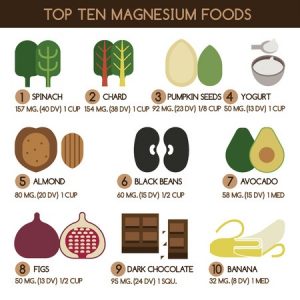Why you NEED Magnesium
You are always hearing it said that you need Magnesium, but do you really know why?

Most people just know it as the muscle relaxant that it is and that it can be beneficial after exercise.
Magnesium deficiency is one of the leading nutrient deficiencies in the body. It is now estimated that approximately 80% of people are deficient in magnesium.
Typically, in today’s farming societies across the world, soils have been depleted of their natural stores of magnesium due to current farming practices and the use of pesticides and herbicides. It is also due to digestive disorders that in turn create the malabsorption of magnesium and other minerals throughout the gut along with antibiotic use and prescription medication. These factors all damage the digestive tract which is why magnesium supplementation is vitally important to be included in our diet.
On top of all of this, the body loses its stores of magnesium every day from normal functioning such as hormone production, movement of muscles and maintaining a regular heartbeat.
For a lot of people, magnesium deficiency will cause noticeable negative symptoms and these include muscle aches or spasms, poor digestion, trouble sleeping and anxiety. But it is often overlooked and rarely tested for. This has resulted in it being one of the most underutilized nutrient supplements that we all actually need.
Magnesium is involved in over 300 biochemical functions in the body, so it’s certainly one of the most crucial to our overall health.
Here are a just a few other reasons that you need magnesium:
- Helps neurotransmitter (brain) functions
- Improves sleep
- Strengthens bladder tone
- May help to remove substances that cause body odor
- May assist with inflammation in the body
- Relieves headaches
- Helps with PMS
- Assists with muscle relaxation
- Has a dramatic effect during pregnancy on reducing birth defects.
- Improves athletic performance
- Can reduce the absorption of some dietary fats
- Helps to prevent fractures (64% of the body’s magnesium is stored in the bones)
- Vital catalyst for enzyme activity – especially the enzymes needed for energy production.
- Required by every cell in the human body to help maintain the proper electrical charge gradient across Cell Membranes.
Some Signs of Magnesium Deficiency:
- Poor Concentration
- Confusion
- Anxiety
- Irritability
- Nervousness
- Aggression
- Loss of Appetite
- Migraine & Cluster Headaches
- Restless Leg Syndrome
- Kidney Stones
- Poor Bone Density
It can get very confusing when you go to purchase Magnesium of just how many different forms there are – and which one is best for you! Most likely there will be Magnesium in a citrate, chelate, chloride, glycinate or threonate form!
So, here is a quick rundown:
Magnesium Citrate: Magnesium combined with citric acid. May have a laxative effect if taken in high doses. However, in moderate doses it is safe to use for preventing constipation and improving digestion.
Magnesium Glycinate: This highly absorbable form is recommended for anyone with a known magnesium deficiency. Less likely to cause laxative effects than other forms of magnesium supplements.
Magnesium Chelate: Highly absorbable by the body and is the form that is naturally found in foods. This type is bound to multiple amino acids (proteins) and used to restore magnesium levels.
Magnesium Chloride Oil: An oil form of Magnesium this is applied to the skin and transferred transdermally (through the skin). Ideal for people who have digestive disorders and cannot absorb magnesium from their food and into their gut. Used topically it can dull muscle pain and is sometimes used by athletes to increase energy and endurance.
Magnesium Threonate: This form has a high level of absorbability as it can actually penetrate the mitochondrial membrane. Not widely used at present as more research is currently being conducted into this form of magnesium supplementation. However, is likely that in the future it will become more readily available.
